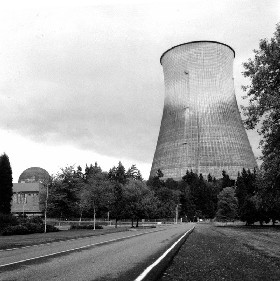 The U.S. may soon get its first nuclear reactor in more than 30 years. UniStar Nuclear Energy — a joint venture between Baltimore-based Constellation Energy and the EDF Group — has proposed a new reactor for southern Maryland capable of generating 1,600 megawatts and powering 1.3 million homes twenty-four hours a day.
The U.S. may soon get its first nuclear reactor in more than 30 years. UniStar Nuclear Energy — a joint venture between Baltimore-based Constellation Energy and the EDF Group — has proposed a new reactor for southern Maryland capable of generating 1,600 megawatts and powering 1.3 million homes twenty-four hours a day.
To put this in context, the largest wind power installation in the world, the Horse Hollow Wind Energy Center in Texas, generates 735 megawatts — but only when it’s windy. Nuclear, by comparison, is massive.
Having cleared the U.S. Nuclear Regulatory Commission and the New York Public Service Commission, the project is in the final phase of due diligence for a cut of the $18.5 billion in federal dollars earmarked for advanced nuclear development. There seems to be only one remaining roadblock: the Maryland Public Service Commission.
Even though the MPSC approved the reactor itself in late June after an 18-month study, there has been a great deal of protest around the hearings for the deal between Constellation Energy and the EDF Group. With a price tag of $7 billion, the reactor will require not only federal loan guarantees, but also substantial investment from EDF, requiring them to purchase a 50 percent stake in Constellation.
AI Weekly
The must-read newsletter for AI and Big Data industry written by Khari Johnson, Kyle Wiggers, and Seth Colaner.
Included with VentureBeat Insider and VentureBeat VIP memberships.
This seems straightforward enough. But the snag — apparently large enough to re-open MPSC hearings several times — lies in whether the investment would give French EDF too much influence over an American power company, Constellation’s subsidiary Baltimore Power & Light.
Those opposing the reactor and the deal between EDF and Constellation have called attention to potential energy rate hikes that could be levied to offset the cost of the plant’s construction. Despite what EDF calls “overwhelming public support” for the reactor voiced during the hearings, it seems there is a small but significant group opposed to it on financial terms. This group has issued construction estimates of up to $15 billion.
To counter these arguments, Constellation says the deal’s approval would create 4,000 construction jobs as well as 400 permanent positions at the reactor, while ultimately benefiting the area with cheaper electricity as well.
A hot topic of debate in the region, the reactor is emblematic of the U.S. nuclear industry as a whole. If one of the first realistic proposals in 30 years is stopped, how much hope will there be for the next?
VentureBeat's mission is to be a digital town square for technical decision-makers to gain knowledge about transformative enterprise technology and transact. Learn More